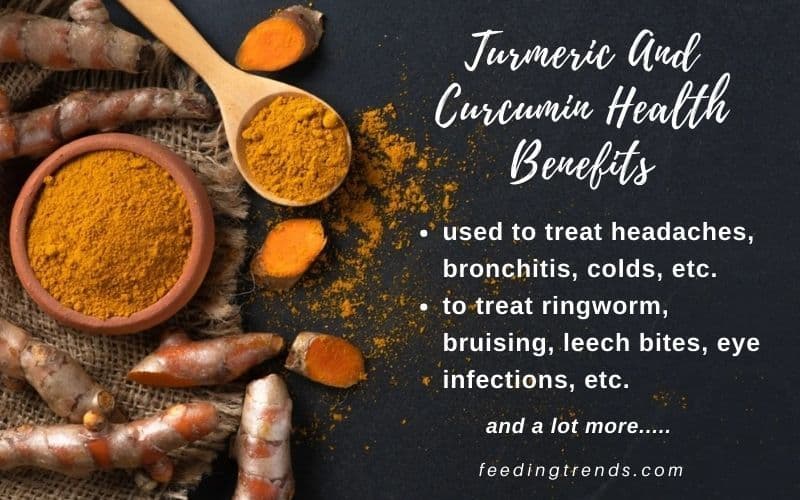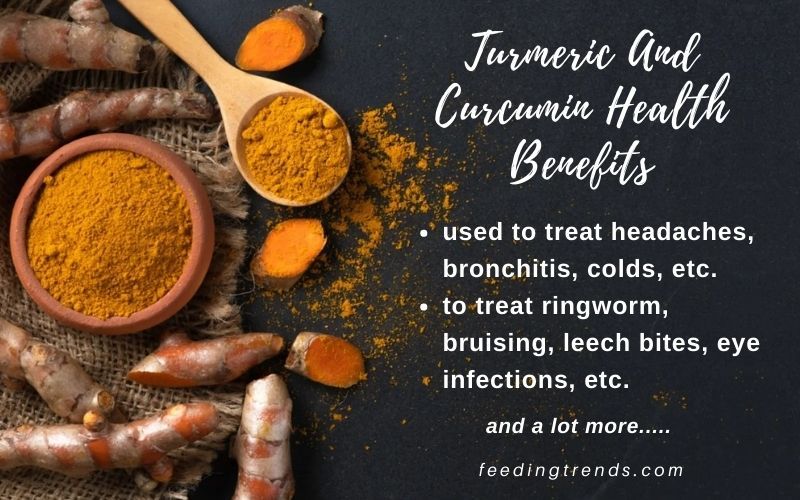
Turmeric And Curcumin Health Benefits
Since ancient times, yogis and ayurvedic physicians have been aware of turmeric's many medicinal properties.
Turmeric root is a ginger root cousin that is mostly produced in India. It's dried and ground into a fine powder with a lovely gold colour that's used in a number of Indian cuisines.

Turmeric is considered highly lucky in India, and it has long been used in a variety of Indian rituals. It is still used for weddings and religious rites in every part of India today.
Benefits:
Turmeric is used to cure a variety of ailments, including arthritis, dyspepsia, stomach pain, diarrhea, gas in the intestines, stomach bloating, loss of appetite, jaundice, liver difficulties, and gallbladder problems.
- It's also used to treat headaches, bronchitis, colds, lung infections, leprosy, fever, menstruation abnormalities, and cancer, among other things. Other uses include depression, Alzheimer's disease, water retention, worms, and renal problems.
- Some people use turmeric to treat ringworm, bruising, leech bites, eye infections, inflammatory skin problems, mouth pain, and infected wounds.
Curcumin vs Turmeric: What's the Difference?
Turmeric has almost a hundred different chemicals. The active component curcumin, which is responsible for the majority of turmeric's health benefits, receives the most attention.
Turmeric's bright yellow color comes from curcumin, which makes up just around 5% of the spice. The majority of turmeric's health advantages are due to curcumin.
What Are Turmeric and Curcumin Health Benefits?
Turmeric isn't only a bright, tasty spice; it also offers a long list of potential health benefits.
Curcumin, the key plant component that gives turmeric its bright yellow color, has been linked with many of its benefits.
Turmeric and curcumin can help your health in a variety of ways:
Here are the top 4 evidence-based health benefits of turmeric and curcumin.
- Turmeric contains anti-inflammatory and anti-cancer bioactive compounds:
- Turmeric, on the other hand, does not contain a lot of curcumin. It makes up roughly 3% of the total weight. The bulk of studies on this plant use curcumin-rich turmeric formulations, with daily dosages, frequently exceeding 1 gram.
- These amounts would be impossible to reach just through the use of turmeric as a spice.
- One of the reasons why some individuals choose to take supplements is because of this.
Curcumin, on the other hand, has a low absorption rate in the circulatory system. To reap all of the advantages of curcumin, its bioavailability (the rate at which your body absorbs a chemical) must improve.
It goes very well with black pepper, which contains piperine. Piperine is a natural chemical that boosts curcumin absorption by 2,000 percent.
The finest curcumin tablets include piperine, which makes them far more powerful.
Curcumin is also fat-soluble, which means that when it comes into touch with fat or oil, it dissolves and breaks down. As a result, combining curcumin pills with a high-fat diet might be beneficial.
Curcumin is a naturally occurring anti-inflammatory compound:
Inflammation's impact cannot be emphasized. It helps in the fight against foreign invaders and in the recovery of bodily injuries.
While acute, short-term inflammation is beneficial, it can become a problem if it persists and causes tissue destruction.
According to experts, chronic low-level inflammation is now considered to play a role in a range of health issues and diseases. Here are a few examples
- A cardiovascular disease
- Cancer
- Metabolic syndrome is a phrase used to describe a group of people who has a variety of health problems?
- Alzheimer's is a disease that affects people of all ages.
- Degenerative illnesses come in a variety of forms.
As the result, anything that might reduce chronic inflammation could be beneficial in the prevention and treatment of these illnesses.
Turmeric may aid in the prevention of cancer:
- Cancer is a disease characterized by uncontrolled cell proliferation. Curcumin pills tend to be effective against a variety of cancers.
- Curcumin has been researched as a cancer therapy herb and has been found to slow the progression of cancer.
According to studies, it has the ability to:
- Malignant cells can be aided in their demise.
- It is necessary to stop angiogenesis (growth of new blood vessels in tumors)
- Stop the spread of cancer (spread of cancer)
- It's still uncertain if high-dose curcumin, ideally in combination with an absorption booster like piperine can help humans cure cancer.
However, there is evidence that it may help prevent cancer, especially malignancies of the digestive tract such as colorectal cancer.
Curcumin might aid in the treatment of Alzheimer's Disease:
Alzheimer's disease, which accounts for up to 70% of all dementia cases, is the most common kind.
While some of the symptoms of Alzheimer's disease can be controlled, the disease itself is fatal. That's why it's so important to keep it from happening in the first place.
Curcumin has been discovered to cross the blood-brain barrier, indicating that there may be some good news on the road.
Curcumin has anti-inflammatory and antioxidant effects, and inflammation and oxidative damage is known to have a role in Alzheimer's disease.
The accumulation of protein tangles known as amyloid plaques is also a significant characteristic of Alzheimer's disease. Curcumin has been proven in trials to help in plaque clearance.
Curcumin's ability to delay or perhaps reverse the course of Alzheimer's disease in individuals is unknown at this time, and further research is needed.
Read more:
Appreciate the creator